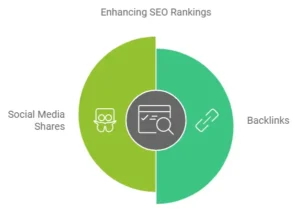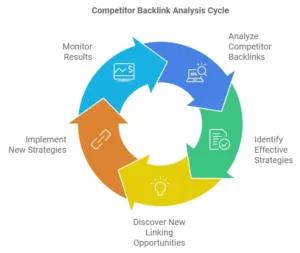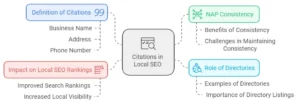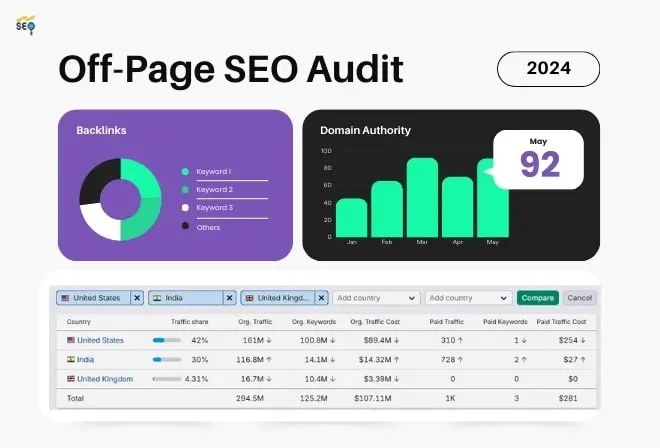Off-page SEO plays a critical role in determining your website’s ranking potential. While on-page SEO ensures your site is technically sound and content-rich, off-page SEO is all about improving your site’s authority and trustworthiness through external efforts. If you and your competitor have the same quality content but your competitor has better quality backlinks, then your competitor will rank higher than you in search engines. In this guide, we’ll walk you through how to conduct an off-page SEO audit to enhance your website’s performance and rankings.
Introduction to Off-Page SEO Auditing
What is Off-Page SEO?
Off-page SEO refers to all the actions you take outside of your website to improve your search engine rankings. This includes building backlinks, improving social media presence, and increasing brand visibility online. While you may have great content, off-page SEO is the secret sauce that can make your website more authoritative and trustworthy in the eyes of search engines like Google.
Importance of Off-Page SEO Audits
An off-page SEO audit helps you understand what’s working and what’s not in your SEO strategy. It allows you to identify opportunities for improvement, remove harmful backlinks, and improve your website’s credibility.
Understanding the Role of Off-Page SEO
Difference Between On-Page and Off-Page SEO
While on-page SEO deals with optimizing the content and structure of your website, off-page SEO focuses on building relationships and external signals that drive authority. Both are essential, but off-page SEO can have a larger impact on how search engines perceive your website’s relevance.
How Off-Page SEO Impacts Rankings
Off-page SEO signals such as backlinks and social media shares indicate to search engines that your content is valuable, helping to push your rankings higher. The more high-quality backlinks you have, the better your chances of ranking well.

Benefits of Conducting an Off-Page SEO Audit
Identifying Weaknesses in Your SEO Strategy
An audit gives you a clear picture of where your off-page efforts are falling short. You might discover toxic backlinks or low social media engagement—issues that need immediate attention.
Opportunities for Growth and Improvement
An audit is also a chance to find areas where you can grow. Whether it’s leveraging more guest posting opportunities or improving brand mentions, identifying new opportunities is key to staying ahead of competitors.
Preparing for an Off-Page SEO Audit
Setting Clear Goals for the Audit
Before diving into an audit, set clear objectives. Are you focused on removing bad backlinks, improving your domain authority, or boosting your social media presence? Defining your goals will make the audit more productive.
Tools You Need for an Effective Audit
Several tools can help you perform an off-page SEO audit. Tools like Ahrefs, Moz, and SEMrush allow you to analyze backlinks, track brand mentions, and monitor competitor strategies.
Backlink Analysis
How to Check Your Backlink Profile
Your backlink profile is a collection of all the websites linking to your content. You’ll want to check for both the number of backlinks and the quality of those links. A good starting point is to use tools like Ahrefs or Moz to gather this data.
Understanding Backlink Quality
Not all backlinks are created equal. High-quality backlinks from authoritative sites are more valuable than numerous low-quality links. You should prioritize backlinks from websites that are relevant to your niche and have high domain authority.
Identifying Toxic Backlinks
Toxic backlinks are links from spammy or irrelevant sites that can harm your SEO efforts. Using a tool like Google’s Disavow Tool, you can get rid of toxic links to protect your site’s reputation.
Competitor Backlink Analysis

Why Analyzing Competitors’ Backlinks Matters
Your competitors’ backlinks offer insights into what works and what doesn’t in your niche. By analyzing their backlink profile, you can discover new linking opportunities.
Tools for Competitor Backlink Research
Use tools like SEMrush and Ahrefs,Spyfu to dig into your competitors’ backlink profiles. This will help you identify where they’re getting their most powerful backlinks from, giving you ideas for your own strategy.
Using Competitor Insights for Improvement
Take notes on which websites are linking to your competitors. Reach out to those sites with better content or offers to earn those links for yourself.
Anchor Text Distribution
Why Anchor Text Matters in Off-Page SEO
Anchor text—the clickable text in a hyperlink—plays a big role in signaling to search engines what your linked content is about. Overuse of the same anchor text can look spammy, so balance is key.
Analyzing Anchor Text Variations
An audit of your anchor text should show a healthy variety. Avoid overusing exact match keywords and aim for a mix of branded, generic, and keyword-rich anchor texts.
Ideal Anchor Text Distribution
A good rule of thumb is to keep exact match anchor texts to under 30% of your total backlinks. The rest should be a mix of branded, phrase, and generic terms.
Social Media Signals
How Social Media Influences Off-Page SEO
While social media shares don’t directly affect SEO rankings, they increase the visibility of your content and attract potential backlinks. The more people who see and share your content, the better.
Measuring Social Media Engagement and Shares
To gauge the effectiveness of your social media presence, look at the number of shares, likes, and comments your posts receive. Tools like BuzzSumo can help measure social media engagement.
Using Social Platforms to Boost SEO
Consistently sharing valuable content on social media platforms can drive traffic back to your site, creating more opportunities for backlinks and improving your off-page SEO efforts.
Brand Mentions and Citations
Importance of Unlinked Brand Mentions
Unlinked brand mentions are when other sites mention your brand without linking to it. These are still valuable and can contribute to your authority. However, reaching out and asking for a link can provide an extra SEO boost.
How to Track and Leverage Brand Mentions
Use tools like Google Alerts or Mention to track your brand mentions. Once identified, contact the site owners to request a backlink, turning those mentions into valuable SEO assets.
Local SEO Off-Page Audit

Role of Citations in Local SEO
Citations are mentions of your business’s name, address, and phone number (NAP) across the web. Consistent citations, especially in directories, can improve your local SEO rankings.
Ensuring NAP Consistency
Ensure that your business’s NAP information is consistent across all platforms. Inconsistent details can confuse search engines and hurt your local SEO efforts.
Guest Posting and Content Marketing
Evaluating Guest Post Opportunities
Guest posting is a powerful way to earn backlinks. But not all guest post opportunities are created equal. Aim to post on reputable sites within your niche for maximum impact.
Assessing the Impact of Content Marketing
Content marketing goes hand-in-hand with off-page SEO. High-quality content attracts backlinks naturally. Focus on creating valuable, shareable content to improve your off-page SEO.
Influencer Outreach and Collaborations
How Influencers Affect Off-Page SEO
Influencers can drive traffic and generate backlinks by sharing your content with their audience. Partnering with influencers in your niche can boost both your reach and your off-page SEO.
Finding Relevant Influencers for Your Niche
Use platforms like BuzzSumo or Influence.co to find influencers who align with your brand’s goals. Building strong relationships with influencers can enhance your off-page SEO efforts.
Monitoring Online Reviews
The Impact of Reviews on Off-Page SEO
Online reviews, particularly for local businesses, are important off-page SEO signals. Positive reviews increase trust and can improve rankings, especially in local search results.
Tools for Managing and Responding to Reviews
Platforms like Google My Business and Yelp allow you to monitor and respond to reviews. Actively managing your reviews will not only boost your SEO but also enhance your brand reputation.
Tracking Progress Over Time
How to Monitor Off-Page SEO Improvements
Tracking your progress is crucial. Tools like Ahrefs and SEMrush offer detailed reports on backlinks, mentions, and overall off-page performance.
Regular Audits and Adjustments for Optimal Performance
Off-page SEO is not a one-and-done task. Regular audits are essential to keep your strategy up to date and competitive. Consistently analyze your backlink profile, social signals, and brand mentions.
Conclusion and Next Steps
Off-page SEO is an ongoing effort that requires regular analysis and adjustment. By conducting an off-page SEO audit, you can identify weak points, improve your strategy, and enhance your site’s authority. Implement the findings from your audit to see consistent improvements in your website’s search engine rankings.
FAQs
- What is an off-page SEO audit?
An off-page SEO audit is an analysis of all external factors that impact your website’s ranking, including backlinks, social media signals, and brand mentions. - How often should I conduct an off-page SEO audit?
Ideally, you should conduct an off-page SEO audit every 3-6 months to ensure your strategy stays effective and competitive. - Which tools are best for off-page SEO audits?
Tools like Ahrefs, SEMrush, and Moz are great for conducting backlink analysis, tracking brand mentions, and monitoring social media signals. - How can I improve my off-page SEO?
Focus on building high-quality backlinks, increasing social media engagement, and collaborating with influencers for maximum impact. - What is the difference between on-page and off-page SEO?
On-page SEO focuses on optimizing the content and structure of your website, while off-page SEO involves external factors like backlinks and brand mentions that affect your site’s authority.

